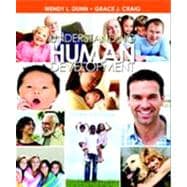
Note: Supplemental materials are not guaranteed with Rental or Used book purchases.
Purchase Benefits
Wendy Dunn is the James Y. Canfield Professor of Psychology at Coe College. Wendy majored in biology and psychology at Iowa State University in Ames, Iowa, where she also worked at the National Animal Disease Laboratory. She earned a master’s degree, also at Iowa State, in experimental psychology. Taking a break from education, she next worked at a nationally-known marketing research firm, but ultimately decided that teaching undergraduates was her true passion. She subsequently earned two doctoral degrees from the University of Iowa, one in educational psychology and, supported by Coe College, a second in management and organizations. Wendy’s diverse career interests have led her, at various times, to serve in administrative, as well as teaching roles at Coe. She worked for a time as Vice-President for Academic Affairs and Dean of the Faculty, and she currently holds a joint appointment as Professor and Director of Institutional Research and Planning at Coe. Although Wendy has published her research in major journals and is an author of three texts in the field of psychology, her true love is teaching, and it is this activity that gives her the most pleasure. Students consistently comment on Wendy’s ability to inspire their curiosity about human nature, and they have honored her by electing her to receive the colleges’ highest teaching recognition – the C. J. Lynch award for outstanding teaching. Wendy has been married to Greg for 37 years, and together they have raised two children – as such, like all of us, her interest in human development is personal as well as professional.
Grace Craig is Professor Emerita at the University of Massachusetts, at Amherst. Currently, she is semi-retired from the Child, Family and Schools program, teaching specialty seminars intermittently. Grace completed her B.A. in Sociology, with honors in Anthropology at the University of Massachusetts, and her MS and PhD there in Child and Educational Psychology with minors in Clinical Psychology and in Research methods. She took time out for 2 years along the way to practice School Psychology in western Massachusetts She began her academic career as a Lecturer, for 4 years, in the Psychology Department at Smith College, in the late 1960s, -- a time of reassessment in the social sciences and in the society at large. Grace has been married to Ralph Craig for 53 years and together they have one daughter and one grandson.
In this Section:
1. Brief Table of Contents
1. BRIEF TABLE OF CONTENTS:
Chapter 1: Introduction to Human Development
Chapter 2: Heredity and Environment
Chapter 3: Prenatal Development and Childbirth
Chapter 4: Infancy and Toddlerhood: Physical, Cognitive, and Language Development
Chapter 5: Infancy and Toddlerhood: Personality and Sociocultural Development
Chapter 6: Early Childhood: Physical, Cognitive, and Language Development
Chapter 7: Early Childhood: Personality and Sociocultural Development
Chapter 8: Middle Childhood: Physical and Cognitive Development
Chapter 9: Middle Childhood: Personality and Sociocultural Development
Chapter 10: Adolescence and Emerging Adulthood: Physical and Cognitive Development
Chapter 11: Adolescence and Emerging Adulthood: Personality and Sociocultural Development
Chapter 12: Young Adulthood: Physical and Cognitive Development
Chapter 13: Young Adulthood: Personality and Sociocultural Development
Chapter 14: Middle Adulthood: Physical and Cognitive Development
Chapter 15: Middle Adulthood: Personality and Sociocultural Development
Chapter 16: Older Adulthood: Physical and Cognitive Development
Chapter 17: Older Adulthood: Personality and Sociocultural Development
Chapter 18: Death and Dying
Answers to Review the Facts
The New copy of this book will include any supplemental materials advertised. Please check the title of the book to determine if it should include any access cards, study guides, lab manuals, CDs, etc.
The Used, Rental and eBook copies of this book are not guaranteed to include any supplemental materials. Typically, only the book itself is included. This is true even if the title states it includes any access cards, study guides, lab manuals, CDs, etc.